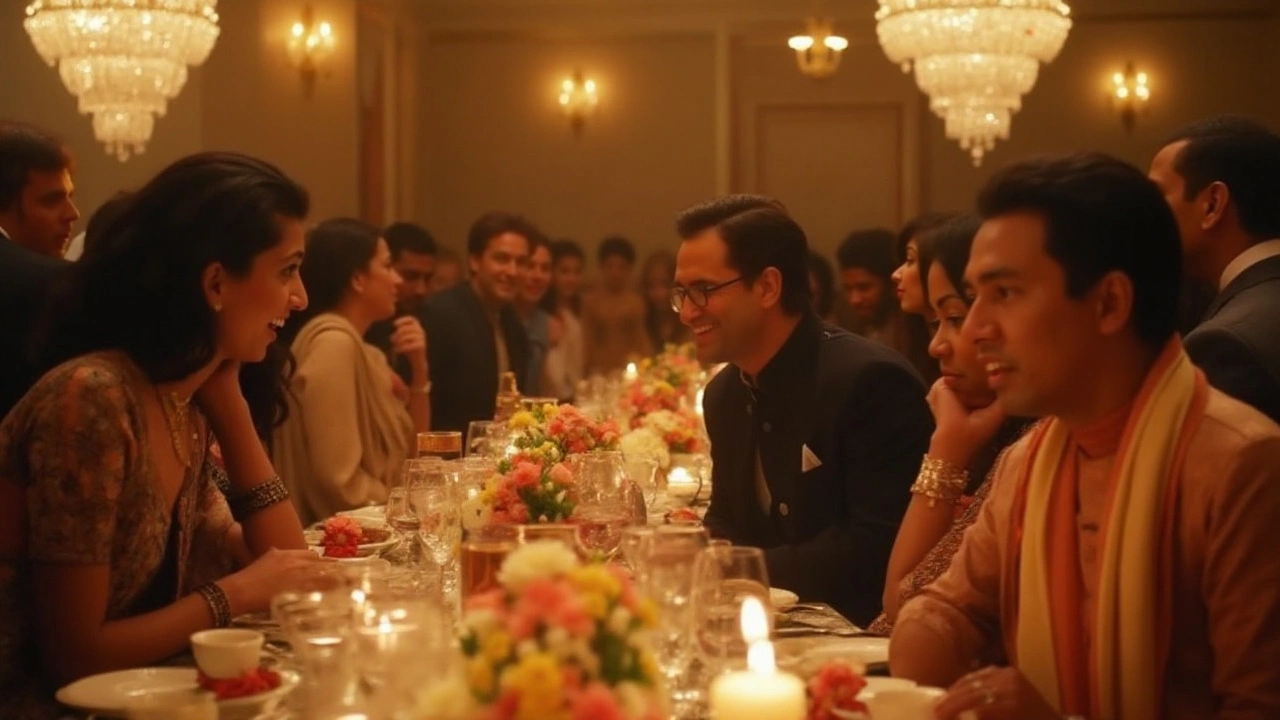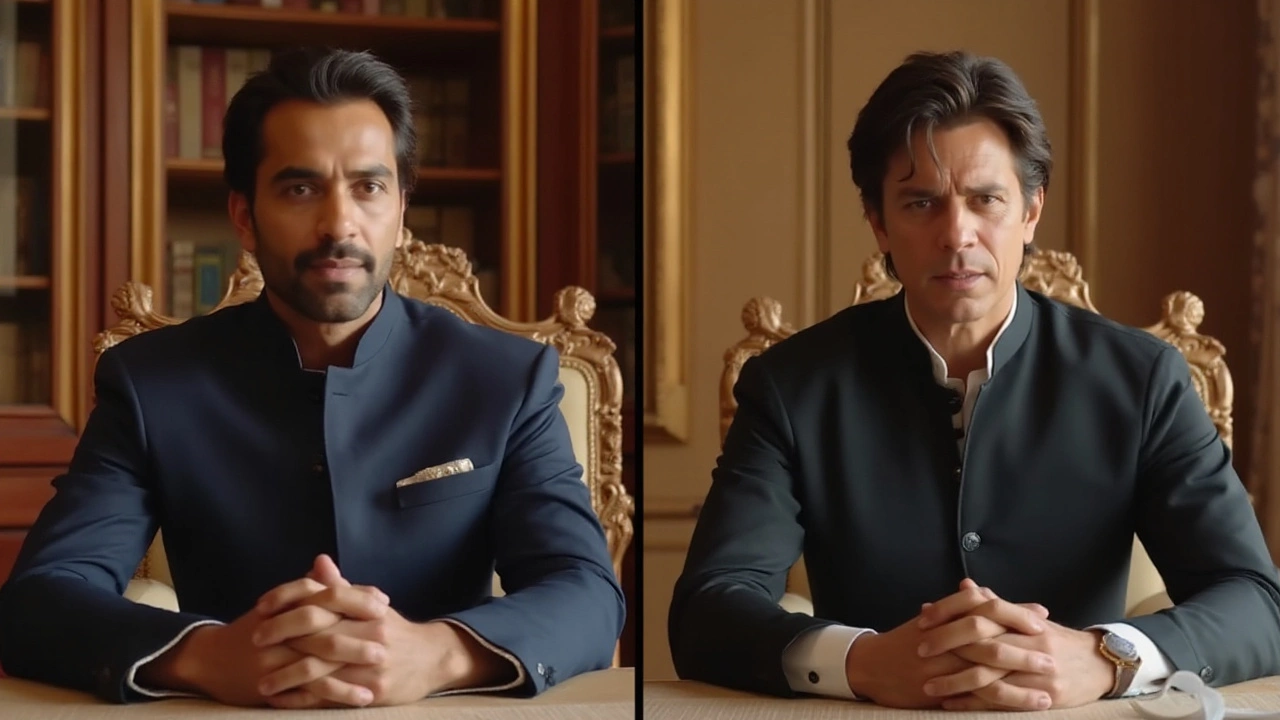
The shimmering world of Bollywood is not just about the glitz and glamour; it's also about the substantial fortunes amassed by its stars. Among these luminaries, Saif Ali Khan and Shah Rukh Khan are prominent figures whose wealth is often the subject of much speculation and intrigue.
While Saif, coming from a royal lineage, has carved a niche for himself with his distinct choice of roles, Shah Rukh, often referred to as the 'King of Bollywood', has an expansive career and numerous business ventures to his name. This article delves into the financial profiles of these two superstars, providing insights beyond just their film earnings.
Join us as we explore their paths to prosperity, dissecting their current financial standings and what makes their wealth story so captivating. Whether it's Saif's royal heritage and select filmography or Shah Rukh's vast array of film credits and entrepreneurial ventures, the narrative is as compelling as their on-screen personas.
- The Financial Landscape of Bollywood
- Saif Ali Khan's Wealth Accumulation
- Shah Rukh Khan: The King of Bollywood
- Business Ventures and Investments
- The Verdict: Wealth Comparison
The Financial Landscape of Bollywood
Bollywood, the sprawling Hindi film industry, stands as one of the richest and most influential entertainment sectors globally. Each year, numerous films are released, contributing to its status as a multi-billion-dollar industry. The industry not only captivates audiences in India but also boasts a massive fan base worldwide. This global appeal plays a significant role in the financial success of Bollywood, as films are distributed across continents, from North America to Europe, and increasingly in newer markets. The revenue streams come from domestic box office collections, international ticket sales, satellite rights, and various forms of digital distribution that are finding rapid growth.
The financial architecture of Bollywood is also built upon the hefty earnings from music rights. In India, songs are an integral part of movies, often driving the film’s popularity across diverse demographics. Music albums create additional sources of income for producers and artists alike. The commercial success is amplified by endorsements and brand collaborations, given the influence Bollywood actors wield over millions of fans. Brands leverage the stardom of actors like Saif Ali Khan and Shah Rukh Khan, crafting lucrative partnerships. This intersection of cinema and commerce results in actors often earning substantial figures outside their on-screen roles.
Moreover, the entry of Over-The-Top (OTT) platforms has reshaped Bollywood's revenue landscape, providing fresh avenues for content distribution and storytelling. With a staunch belief in the enduring appeal of Indian cinema, platforms like Netflix and Amazon Prime invest heavily in acquiring movies for streaming, which becomes another revenue stream musicians, scriptwriters, cinematographers, and directors now explore alongside traditional releases. This shift signifies both a challenge and an opportunity for the longstanding industry, with audience preferences changing amid digital consumption.
Domestic talent is not the only contribution; Bollywood imports diverse talent pools, strengthening the industry's creative dimensions. Actors, producers, and directors frequently collaborate with international counterparts, opening more lucrative doors. While filmmaking costs in Bollywood are relatively lower compared to Hollywood, it is the return on investment that often surprises many observers. Another dimension is the significant involvement of the Indian diaspora, a market chunky enough to warrant its section in box office reports.
Naseeruddin Shah, a seasoned Bollywood actor, once said, “Bollywood is not just cinema; it is a powerful business machine that caters to the highest bidder and the influencing section of cinema goers.”
As the world becomes more connected, the shaping of Bollywood's financial landscape will likely continue evolving. Innovative revenue models, the influence of artificial intelligence in production, and the rise of short content formats illustrate this growth pathway. Such expansion ensures that the industry and its superstars—like Saif Ali Khan and Shah Rukh Khan—will continue to thrive, continually pushing their financial success stories to new heights.
Saif Ali Khan's Wealth Accumulation
In the vibrant canvas of Bollywood, Saif Ali Khan stands out not just for his acting prowess but also for his distinct legacy. Hailing from the illustrious Pataudi family, Saif’s journey in the film industry is as much about the silver screen as it is about his astute financial decisions. His wealth accumulation is a tapestry woven with strategic film choices, royal inheritances, and judicious investments. Saif, who made his debut in the 1993 movie "Parampara," soon carved a niche for himself, balancing between commercial hits and critically acclaimed films. Movies like "Dil Chahta Hai," "Omkara," and the recent "Tandav" series display his versatility and have contributed significantly to his earnings. Interestingly, Saif didn’t stop at acting. He expanded his horizons by producing films under his banner, Illuminati Films, a company known for hits like "Love Aaj Kal" and "Go Goa Gone."
When examining his wealth, one must consider Saif's royal background, which provides him a unique advantage. As the son of late Indian cricket captain Mansoor Ali Khan Pataudi and actress Sharmila Tagore, Saif inherited ancestral property and wealth. The Pataudi Palace in Haryana, India, is reportedly valued at millions of dollars and serves as a testament to his patrimonial legacy. But beyond inheritance, Saif's entrepreneurial spirit is evident. As a shrewd investor, he has diversified his portfolio across various sectors. In recent interviews, Saif has subtly hinted at investments in the Indian hospitality sector, aiming to combine his love for art and luxury.
His endorsements also play a significant part in his financial narrative. Saif has been the face of numerous high-profile brands over the years, which not only underlines his market appeal but also his ability to command a substantial fee. His knack for staying relevant is evident in his careful selection of both films and endorsements. A point often noted by the industry insiders is Saif’s ability to evolve with time, a factor that continuously contributes to his wealth. As he once said in an interview with a leading magazine,
"The art is to adapt and stay curious. Cinema is an ever-changing art form, and so is the business around it."
Understanding Saif Ali Khan’s financial success is incomplete without acknowledging his lifestyle choices that intrigue both his fans and critics. With a penchant for style and luxury, his investments also reflect this taste. Reports suggest that his collection of high-end cars, rare antiques, and works of art form a significant part of his asset base. This lifestyle not only enhances his personal brand but also highlights an unorthodox approach to wealth that goes beyond mere financial expansion to include cultural enrichment. His choices, both professional and personal, underline the fact that his wealth accumulation is as much about strategic foresight as it is about heritage.

Shah Rukh Khan: The King of Bollywood
Shah Rukh Khan, affectionately known as SRK, rose to fame in the early '90s and has since become a household name, not just in India but worldwide. Often referred to as the "King of Bollywood," SRK's journey from television to being one of the most bankable stars in Indian cinema is a testament to his talent and charisma. His career spans over three decades, and his portfolio includes a plethora of diverse roles that have won him both critical and commercial acclaim. With over 80 films to his name, Shah Rukh's acting prowess is matched by his unique ability to connect with audiences on a personal level.
SRK's success goes beyond just his acting capabilities; it is also attributed to his astute business acumen. He co-owns Red Chillies Entertainment, a production house that has not only produced many of his films but also ventured into VFX and digital content. His strategic investment in the Kolkata Knight Riders, a franchise cricket team in the Indian Premier League, has paid off handsomely. This diversification into sports and entertainment underscores his vision of expanding his brand beyond films. These ventures have significantly contributed to his overall wealth, positioning him as one of the wealthiest celebrities in the industry.
Known for his humility and hard work, SRK has often spoken about his journey with poignant reflections. He once said,
"Success is not a good teacher, failure makes you humble."This quote reflects his philosophy of learning from failures and persevering through challenges—traits that have made him an icon for aspiring actors and entrepreneurs alike. His influence is not confined to cinema or business; he is also a philanthropist, supporting causes related to health and education, which further garners him respect from fans around the globe.
The star's endorsements are another crucial facet of his brand. From luxury cars to personal gadgets, SRK is the face of numerous high-profile brands. These endorsements not only augment his income but also reinforce his position as a cultural icon. His ability to appeal to various demographic segments—ranging from urban elites to rural masses—makes him an invaluable brand ambassador. However, what truly sets him apart is his enduring charm and his unwavering connection with his audience, which has remained intact despite the many changes in the entertainment landscape.
While his film ventures and endorsements contribute significantly to his financial portfolio, his global brand value remains unmatched. Shah Rukh Khan has received numerous national and international honors, including several honorary doctorates and awards acknowledging his contributions to cinema and philanthropy. This international recognition not only enhances his career profile but also amplifies his earning potential in global markets. Even as the Bollywood industry evolves, his influence and earning capacity resonate strongly, ensuring his spot as one of the richest in the business.
Business Ventures and Investments
Both Saif Ali Khan and Shah Rukh Khan have ventured beyond the silver screen, demonstrating a keen sense for business and investment that complements their acting careers. Among these two stars, Shah Rukh Khan, often dubbed the 'King of Bollywood', showcases a diversified portfolio that solidifies his status not only as an actor but as an astute businessman. One of Shah Rukh’s most significant business ventures is Red Chillies Entertainment, a highly successful production company he founded, which produces a variety of films ranging from edgy independent movies to big-budget blockbusters. This company not only focuses on film production but also has a VFX wing that has worked on numerous high-profile Bollywood projects, further adding to its value and reach.
Shah Rukh's investments extend to the sports arena as well, with perhaps the most notable being his co-ownership of the Kolkata Knight Riders, a team in the Indian Premier League (IPL). The team's success on the cricket pitch has translated into substantial financial returns, making it one of the most profitable franchises in the league. His business acumen doesn’t stop there; Shah Rukh has invested in various other ventures, including a state-of-the-art entertainment hub in Dubai and an array of brand endorsements that include major global products.
"It's the desire to try something new, to keep pushing myself beyond the comfort zone, that drives my business decisions," Shah Rukh was once quoted, highlighting his entrepreneurial spirit.
On the other hand, Saif Ali Khan, with his royal heritage, has approached his investments with a distinctive nuance. While not as high-profile as Shah Rukh's ventures, Saif’s business interests reflect his personal tastes and sensibilities. He has shown interest in the hospitality sector; his familial estate, the Pataudi Palace, has often been likened to an opulent escape with a lucrative potential, though primarily private in its current state. Saif has also been involved in brand endorsements, ranging from luxury watches to spirits, aligning with his suave public image. These activities, although not as industry-spanning as Shah Rukh’s, speak to a strategic augmentation of his wealth built upon his personal brand.
When comparing both actors in terms of business ventures and investments, it’s clear that while Saif Ali Khan’s approach is more reserved and niche-focused, Shah Rukh Khan's ventures display an ambition to leverage his star power across diverse industries. Both strategies, however, reinforce the idea that substantial wealth isn't just confined to movie checks in the world of Bollywood; it includes an expansive and varied enterprise mindset that enables them to stand out not just as stars, but as successful entrepreneurs.

The Verdict: Wealth Comparison
When weighing the financial might of Saif Ali Khan against that of Shah Rukh Khan, it becomes quite the task to crown one as definitively wealthier than the other. Both actors have carved out substantial niches in Bollywood, albeit through different avenues and approaches. Saif Ali Khan, with his regal heritage, benefits from ancestral wealth which includes substantial ancestral properties in several prime locations. His career choices reflect a penchant for versatile roles and projects that resonate with niche audiences, ensuring a steady yet limited stream of income compared to mainstream blockbusters.
On the other hand, Shah Rukh Khan, often hailed as Bollywood's unmatched icon, has a remarkably diverse portfolio. His income draws from an expansive array of blockbuster hits and lucrative brand endorsements. Beyond cinema, his business acumen shines through in various successful ventures, including his ownership stake in the IPL team Kolkata Knight Riders, which not only enhances his profile but adds significantly to his wealth. His production company, Red Chillies Entertainment, further augments his financial stature with high-grossing film projects and innovative content strategies.
To provide a clearer picture, consider this: while Saif's net worth is buoyed by his royal connections and a consistent, albeit select, body of work, Shah Rukh's net worth is a testament to the breadth of his career and entrepreneurial spirit. With an estimated net worth in the realm of billions, Shah Rukh Khan often appears to have the upper hand in this friendly rivalry. Yet, the value of inherited wealth tied with cultural heritage like Saif's can be viewed as invaluable.
As noted by Forbes magazine, "Shah Rukh Khan remains not only one of the highest-paid actors worldwide but also one of the most successful business moguls in India's entertainment sector."
It's compelling to note how differing strategies can yield wealth. Saif embodies the legacy of old-world grandeur with selective modern roles, while Shah Rukh captivates with his near-universal appeal coupled with smart investments and savvy marketing. Though the data might tilt in Shah Rukh's favor when discussing pure monetary terms, the non-quantifiable assets inherited by Saif, such as royal stature and heritage properties, add layers to the debate.
The debate may never have a definitive resolution. Whether one favors royal lineage and enduring family heritage or the self-made triumphant rise of a global star will influence one's view on who holds the upper echelon in terms of wealth. What remains unquestionable is that both stars have significantly influenced and continue to shape the glittering path of Bollywood.





Write a comment